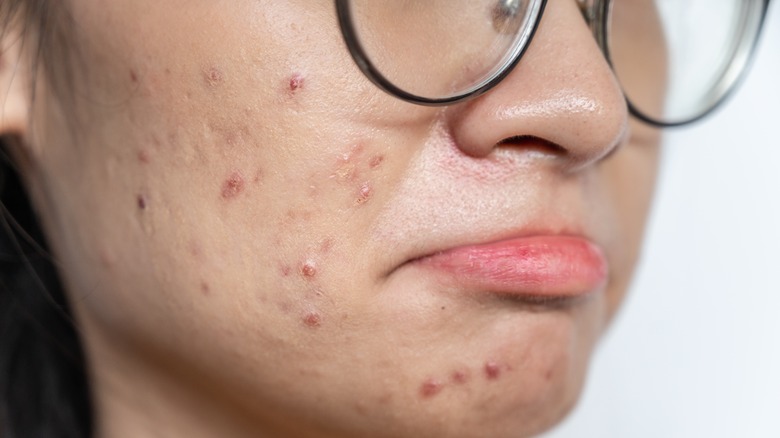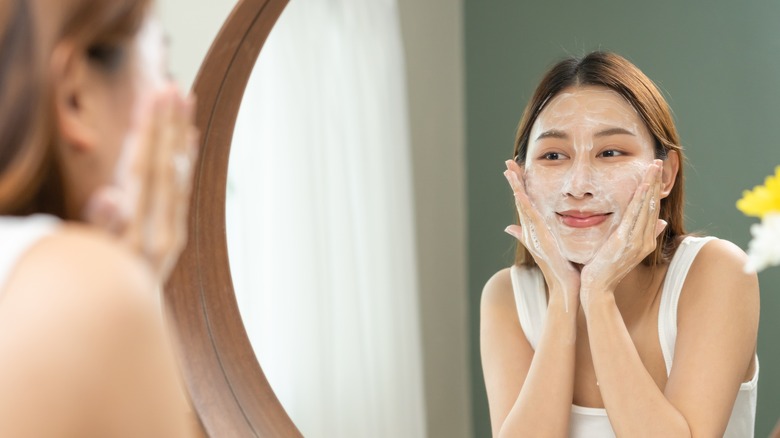Why You Should Stay Away From The Viral 'Aspirin Mask' Acne Treatment Trend
Oh, acne. It seems to exist to curb egotism. Why else would our faces be attacked in the prime of adolescents? Matters get worse when these blemishes persist into young adulthood. Blackheads, whiteheads, and pimples are the three musketeers that always seem to win. However, DIY remedies can be the trick up your sleeve. Smearing toothpaste or garlic on a pimple comes in handy the night before picture day. Another treatment with items already in your house circling social media is the aspirin mask. There are TikTok beauty trends that work wonders for acne, but this isn't one of them.
Using a face mask to fight acne is not new. The cosmetic industry has clay masks, overnight masks, and even LED light masks designed to make blemishes disappear. An aspirin facial sounds like it could work. It is medicine, after all. However, this homemade recipe has dermatologists warning users to abandon ship immediately. If you plan to try this trending treatment, you might want to think again.
The dangers behind the aspirin mask trend
Aspirin is used for helping headaches and cramps, but acne? Using aspirin topically to improve the appearance of acne can make your flare-ups worse. People all over TikTok are fascinated with the aspirin mask. A concoction of the crushed pill and water forms a spreadable paste people smear on their faces. However, this DIY remedy can cause dry skin, irritation, redness, and peeling. The opposite of what treating acne should look like. And using aspirin in conjunction with the proven acne-fighter salicylic acid commonly found in facial cleansers can exacerbate these effects.
So why do many on TikTok swear by this method? Well, it might be because the swelling caused by acne appears to improve. "The aspirin is not treating the acne; it is merely treating the inflammation response," explains board-certified dermatologist Annie Gonzalez (via Health). However, "It is not preventing future breakouts," Dr. Gonzalez says. You want a treatment that tackles the root, not just the symptoms, and definitely, one that doesn't cause more problems. For struggles with acne, try these dermatologist-approved methods.
Tried and true ways to treat acne
The first step to treating acne is identifying what perpetrators you're dealing with. There are different methods for treating blackheads, whiteheads, and pimples. The American Academy of Dermatology suggests using a benzoyl peroxide or salicylic acid cleanser to tackle blackheads and whiteheads. This product will unclog dirt, bacteria, and oil from your pores which causes unsightly blemishes.
Retinoid is another skincare product that cleans pores and prevents dead skin cells from nestling in these follicles. Most importantly, resist the urge to pop and squeeze. Popping pimples or squeezing your pores will cause scarring and spread the bacteria breeding more acne.
To replace the swelling mending aspirin mask, try topical antibiotics. "This type of acne treatment not only kills the bacteria suspected of causing acne but also helps reduce redness and inflammation," says dermatologist Deepa C. Lingam (via The Center for Surgical Dermatology). And for scarring, Dr. Lingam recommends azelaic acid as "it can help manage post-inflammatory hyperpigmentation that occurs with some forms of acne." Talk to your dermatologist for a personalized treatment plan. One thing is for sure an aspirin mask won't be on the list.

